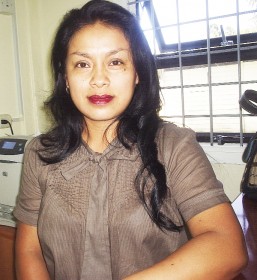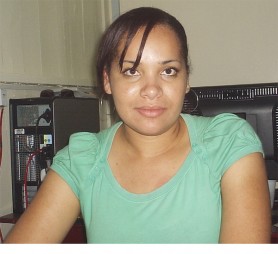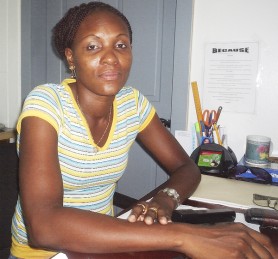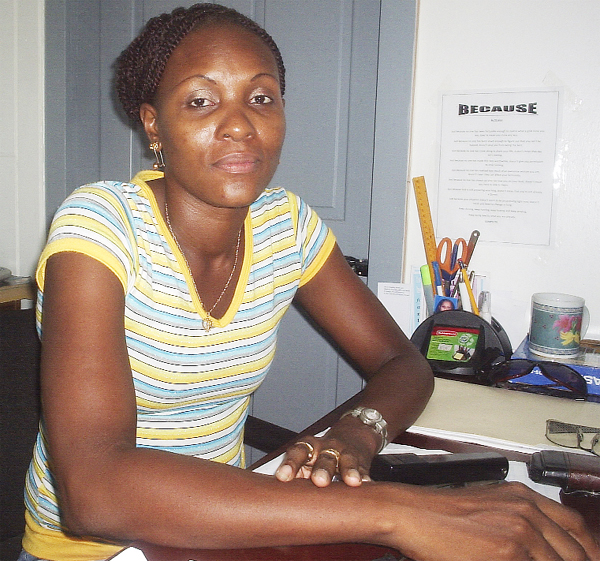Workers persevering despite losses
People are still sick; people still need vaccines; people still need information to make healthy choices
In the aftermath of the Ministry of Health fire, public health workers remain undaunted as they continue with the serious business of providing health care services to the nation.

Minister of Health Dr Leslie Ramsammy exaggerated when after the fire he declared that not a minute of work would be lost – but he was close. As the ruins still smoked mere hours after the fire, employees were up and about and trying to reorganize themselves to serve the public. In fact, some members of the public were not even aware that the main building of the ministry’s Brickdam location had been destroyed until they arrived at the site on the morning of July 17. As a result, some employees were busy logging all the issues the visitors were hoping to have addressed the same day.
The only indication of the devastation to heath care services during a recent visit by Stabroek News was the rubble where the sprawling building of the main ministry once stood. Most employees were zipping around two smaller buildings which were saved from the flames, getting the business of the day done.
Some of them took time out to share their experiences after the fire and how they are coping

with the relocation, which for some has been a blessing in disguise as they find the smaller office space has speeded up productivity and fostered better working relations. While they were broken up over the fire they also quickly added that they knew from day one that things would have got back together and that they had role to play in ensuring the ministry was up and running again.
For nutritionist Jacqueline Williams, who has worked at the ministry for roughly 33 years, it was as if her own home had gone up in flames. Williams knew the feeling all too well as she had experienced such a tragedy before. As a result, whenever she hears about fire it always brings back bad memories. She learnt of the tragedy from a news report on the radio while busily preparing for a normal day of work. “I felt as if I was not hearing right,” she recalled, “It felt like a personal loss.”
Williams said she quickly travelled to the ministry and was directed to the Hadfield Street entrance where she met most of her of her colleagues. It was on seeing the smouldering debris that the reality hit home. Immediately, she started to think about her years of work and she wondered how she was going to keep the communication going in her outreach work as her contact numbers were lost. “For about two weeks after the fire I kept remembering things I lost,” Williams said. Meanwhile, she explained that there was no difficulty in relocating as everyone was very cooperative and the workers were accommodated in the new spaces comfortably. For her, it was just getting on with the work that needed to be done.
It was the same thing for Tricia Azaire, the administrative assistant to Permanent Secretary Hydar Ally, who said she refused to sit and cry about the tragedy. Instead, she focused on picking up the pieces and moving ahead with the work at hand. She learnt of the fire at around 3am and despite the shock she hurried down to the minister. Employees were summoned to a meeting later in the morning and were briefed. Not one to allow anything to get her down, Azaire said that she immediately got her department together and they quickly got things going.
The ministry’s bond is at Kingston and Azaire said she quickly put pen to paper and requisitioned all the things they would need to get work started. “So I don’t think at any point we actually stopped working,” she explained, adding that though they did not have an office they were still working. Initially, the move was not easy as the space they were allocated needed renovation and there were ashes everywhere, but these small setbacks were rectified shortly after and things were up and running. “We are quite comfortable. In some instances, the relocation is even better as I find the flow of things is better because the offices are closer,” she said. Noting that things are getting done at a much faster pace, she added, “As they say, out of every bad there is some good.” She said too that when such tragedies occur people realise the value of a job and she is happy that no one was injured in the fire.

Upon learning of the fire when a friend sent her a text message, the first thing that crossed the mind of Secretary to the Central Board of Health and Medical Council Juanita Johnson was that years of records had been lost. “The first thing I thought was ‘Oh God, Oh God,’ in shock and then I start to think about all the records that may be lost,” she recalled, adding that when she reached the site only the stairs to the building were standing.
Eventually, when she got a chance the first thing she attempted to verify was whether the cabinets that held the records might have withstood the fire. Although they had, she later learnt the records were not as lucky as the intense heat had destroyed them. All was not lost, however, since some documents were retrieved electronically.
At present Johnson and others in her department are reconstructing the records as she is aware of the valuable service they provide to the public. She described the fire as a “little setback” as they are not slowing down in getting their work done. According to her, the ministry workers are coping quite well since the relocation was a comfortable process and the most important thing is that they have somewhere to call an office. One of the lessons she learnt from the tragedy is that “you should not take nothing or anyone for granted.”
School Health Co-ordinator Suelle Findlay-Williams equated the destruction of the ministry with a personal loss. She learned of the fire while preparing for work. “The first thing I thought was who in the world would even think about doing something like that,” she said, “Then I started to think whether I may have left someone or I did something; it was a period of introspection.”
Findlay-Williams also pondered the projects her department had initiated and what would become of them, even as she hoped that it was just a “little piece” of the ministry that was burnt.
Not so, she realised, and when she turned up at the ministry she felt a sense of displacement.
But like the others, her department did not slow down as the very next day it was temporarily relocated to the National Aids Programme Secretariat where work recommenced. Although she remained in shock for a very long time afterward, Findlay-Williams had to get things done as there were timelines that had to be met.
Some documents were recovered electronically and she said it was good to see people work and operate under pressure and still give one hundred per cent after the tragedy. In the days following the fire, there were many “Oh my gosh!” moments, as persons thought about the many things that were lost that they needed to assist them with work. “But working in health, in spite of setbacks, must continue,” Findlay-Williams said, “People are still sick; people still need vaccines; people still need information to make healthy choices.”

